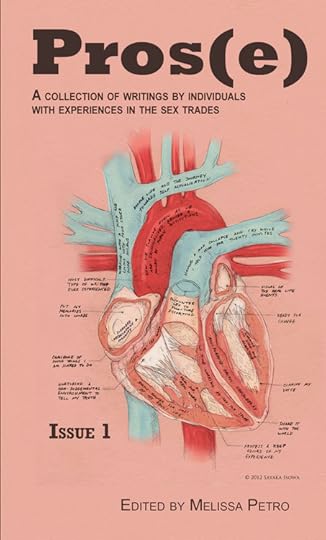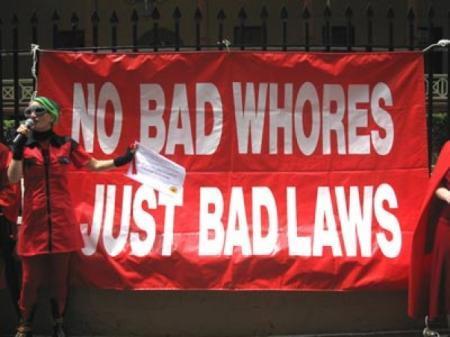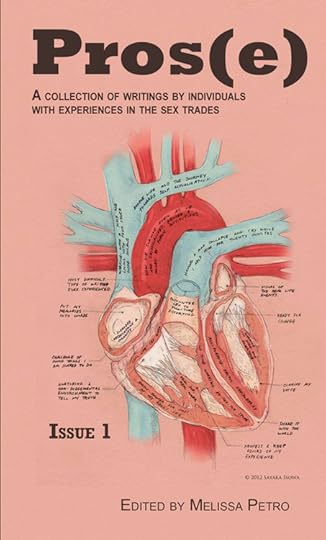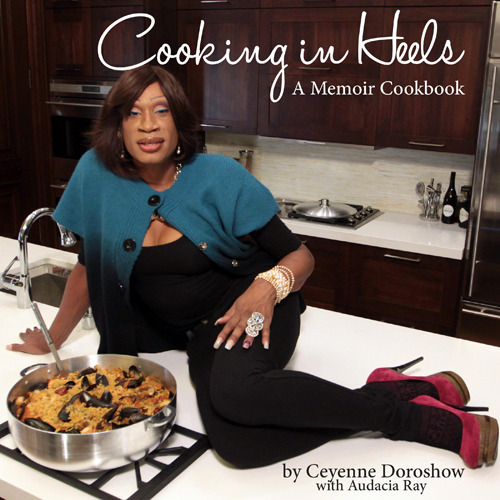Audacia Ray's Blog, page 28
March 4, 2013
"You could be melodramatic and say: just like that Maria Griffiths is homeless and unemployed in New..."
-
from NEVADA by Imogen Binnie
Pre-orders ship now from store.topsidepress.com/nevada
($17.95 via paypal will make all your trans lit fantasies come true)
Just started reading this morning! And can’t put it down.
March 1, 2013
Red Umbrella Project: 'Fist' by Josh Ryley ::an excerpt from Pros(e)::

We’re so excited for our upcoming 2013 Memoir Writing Workshop that we’ve decided to highlight some excerpts from the previous workshop’s final publication, Pros(e).
Enjoy!
—-
Fist
by Josh Ryley
“I have the gloves over there, Sir. I would like to start out with toys and work my way up to your fist. I’m making the J-lube and it’ll be ready in a second so feel free to get undressed.”
“What’s J-lube?”
“It’s lube that’s used in gynecological examinations for farm animals.” He placed the bowl in the microwave. “I like to warm it up a bit.”
With that he turned and smiled as if he’d just said, “My secret ingredient is a dash of nutmeg—shhhhh don’t tell anyone!”
Farm lube?! What happened to simple “boy butter”— the lubricant I had often seen in sex store windows that made me think of happy twinks milking cows to make an all natural lube for their tender hairless asses. Why animal lube used for cow vaginas? My stomach was sinking and I checked the clock. Only 15 minutes had passed. This would be a long three hours.
I repeated my mantra, “If anyone can do this I can.”
“I’ll need you to put on the gloves, then add the lube to your hand. Once you lube my ass you need to pull out and put this on it and rub it on the inside of my rectum”
He handed me a small brown bottle with a powder in it.
“What is this?” I was losing control of the situation. I was not being a dominant top.
“Coke. I want you to put it in my ass—if you want some you are welcome.”
“I’m sober,” I lied, although it was true I didn’t do drugs with clients. Clients are unpredictable enough on drugs that why would I choose to further complicate my situation by being fucked up as well? It was also true that I hated coke.
“Your loss, but you don’t mind doing it, do you?”
“No! I asked you to call me SIR and if you mess up again I WILL LEAVE!” Dominant Josh was back.
“Oh no! You can’t leave, please don’t!” He was almost crying right when the microwave dinged.
“Sounds like we’re ready,” he smiled. His emotions turned like a light switch.
(want to read more by Josh Ryley or any of the other authors featured in Pros(e)? Check out our bookstore.)
February 27, 2013
(via Online and offline sex worker rights are human rights |...

(via Online and offline sex worker rights are human rights | Association for Progressive Communications)
Pretty much the only time I sign internet petitions is when people who are working on the offline campaign believe that it will help them to be able to demonstrate online support. This petition, which supports the rights of cisgender women who are sex workers in several places in Africa, is one of those. Check it out, learn about the human rights abuses sex workers in Africa and currently facing, and sign!
Red Umbrella Project: Join us on March 7th for the Red Umbrella Diaries: Pretty Woman REDux!
Thing 1: the upcoming Red Umbrella Diaries event is going to be awesome - we’re turning Pretty Woman on its head.
Thing 2: Red Umbrella Project has a tumblr now and you should follow it for media tips, sex worker stories, advocacy news, and …. also obviously lots of reblogs. Cuz ya know, tumblr.
Special Event: hosted and curated by Anna Saini Happy Ending, 302 Broome Street between Forsyth and Eldridge, in New York City Doors at 7 pm, event from 8-10 21 and up – FREE
Join us for a night of stories REmixing, REviving and REclaiming mainstream media images of sex work
scubadivergirls:
Mitsubishi Zero Fighter Wreck (Papua New...

Mitsubishi Zero Fighter Wreck (Papua New Guinea)
Wreck diving. Super cool. I hear there are a lot of good wreck sites around NYC… maybe a thing for this summer? Have so far only been diving in warm water, might be a shock
February 24, 2013
Violence Against Indigenous Canadian Sex Workers
by Emily van der Meulen and Jessica Yee and Elya M. Durisin
Canada, like many countries around the world, has a long and ongoing history of colonialism1 and genocide of Indigenous peoples. One of the contemporary legacies of colonialism is racist and sexist discrimination against Indigenous peoples. This is particularly evident in the lives of Indigenous sex workers. While prostitution is technically not illegal in Canada, most of the activities associated with it are prohibited through the Criminal Code. Specifically, there are provisions that criminalise brothels, managers/owners/operators of sex establishments, communication among and between sex workers and clients, and even living on someone’s prostitution earnings.2 Together, the prostitution laws have been shown to effectively increase vulnerability, stigma, and violence.
Over the past three decades, violence against sex workers has dramatically increased across the country with numerous murders occurring in Niagara Falls, Edmonton, and Vancouver. Many of the sex workers who have been killed and who continue to suffer from violence at the hands of perpetrators and the state are Indigenous, or what is commonly referred to in Canada as Aboriginal, which includes First Nations, Inuit, and Métis peoples. Aboriginal people represent just over 3 percent of the total population.
Dual Discrimination
Aboriginal sex workers are subject to dual discrimination as both sex workers and as Aboriginal people. One of the outcomes of discrimination is the high rate of HIV infection. In Ontario, Aboriginal women account for approximately 50 percent of all HIVpositive test reports among Aboriginal people, which is considerably higher than for women in general who account for approximately 25 percent of HIV-positive tests. This dual discrimination also works within the sex trade where Aboriginal women are more likely to be overrepresented in lower-paying and less safe sectors, such as street-based work. According to Maurganne Mooney, an Aboriginal woman and a former sex worker, it is less likely to find First Nations women working in massage parlours or other indoor locations.3 Mooney explains that these women aren’t given as many options in the sex trade.
Further, Aboriginal women are more likely to experience police brutality, racial profiling, and extreme violence, including murder. Over the past twenty years there have been over 580 missing and murdered Aboriginal women (both sex workers and nonsex workers) throughout Canada. Stereotypes about the sexual availability of Aboriginal girls and women continue to normalise this violence and facilitate a context in which these murders and disappearances are largely ignored.
Addressing Systemic Racism
In light of this contemporary context, violence-reduction and sex workpositive strategies, and outreach programmes that are culturally specific, lead by and for Indigenous people are particularly important.
However, the Western sex workers’ rights movement has largely neglected to build relationships and work in solidarity with Indigenous sex workers. Institutional and systemic racism within sex worker organisations is not adequately addressed, which can create unsafe and oppressive environments where Indigenous sex workers may not feel welcome to access services or report violence. Not surprisingly, then, conventional outreach strategies that do not take into account the structural factors that inform Indigenous sexworking realities have led to less than desirable results.
At Maggie’s, the Toronto Sex Workers Action Project, we are addressing this lack of engagement and systemic racism by prioritising the development of a partnership with Aboriginal sex workers and organisations. Maggie’s is Canada’s oldest sex worker-run organisation; our mission is to assist sex workers in their efforts to live and work with safety and dignity. We are based in Toronto, Ontario, and are founded on the belief that in order to improve our circumstances, sex workers must control their own lives and destinies
Peer Outreach
Seeing a need to build solidarity with Aboriginal sex workers, we hired an Aboriginal sex worker in 2006 to start peer outreach specifically to her community. We recorded an 80 percent increase in contacts with street-based Aboriginal sex workers during that time. In response, we developed an Aboriginal-specific programme in partnership with the Ontario Aboriginal HIV/AIDS Strategy, which is also supported by the Native Youth Sexual Health Network. In 2008, we applied for and received funding to initiate the country’s first Aboriginal-specific sex work and HIV programme. This project, called the Aboriginal Sex WorkersEducation and Outreach Project (ASWEOP), is responsive to the needs of Aboriginal street-based sex workers. As such, it operates from a culturally competent and harm reduction framework. An Aboriginal Advisory Committee made up of Aboriginal sex workers, Aboriginal HIV/AIDS and harm reduction community leaders, and an Elder guides the programme and supports the activities of a Project Coordinator and two part-time Peer Outreach Workers.
Specific activities of ASWEOP include: preparation and distribution of safer sex kits; peer outreach to Aboriginal sex workers on the street, in bars, in court, in drop-ins and other venues; distribution of safer sex information in a culturally appropriate and accessible manner; the development of a resource/ health and safety tip booklet; and joining Maggie’s in a December 17th event.
Partnering with Anti-Violence Programmes
ASWEOP works to increase HIV prevention knowledge and decrease social isolation for Aboriginal women working in the street sex trade. The project aims to serve as a model to other organisations working with Aboriginal sex workers by understanding the colonising nature and feminisation of violence towards Aboriginal women. ASWEOP has been in duration for just over a year, and is still in the early stages of designing and implementing specific activities that respond to the high incidence of violence that Aboriginal women experience. Over the next two years, we will develop programming for Aboriginal sex workers that prioritises the historical and systemic roots of violence against Aboriginal people but does not simultaneously harm the agency and self-determination of Aboriginal people engaged in sex work.
In addition to outreach, providing culturally relevant spaces, and hosting awareness-raising events throughout the city of Toronto, ASWEOP is currently collaborating with other
Aboriginal organisations in the province of Ontario whose mandate is to work on violence against Aboriginal people, but previously did not include service delivery that is responsive to the realities of Aboriginal sex workers. We have found so far that the training and knowledge base we are providing is not only long overdue, but is in fact creating concrete opportunities for violence prevention programmes to restructure themselves in a way that is respectful to Aboriginal sex workers. ASWEOP will work in partnership with these organisations towards a more community-driven, multifaceted response that is by and for Aboriginal people.
Maggie’s recognises that violence and patriarchy have long been used as tools to subjugate, disempower and undermine women’s autonomy over our own bodies. Also, racism and colonialism have been effective in oppressing and marginalising Indigenous peoples. Responses to violence against Indigenous sex workers, then, must be aware of these histories and, as such, should be led by Indigenous people themselves. Further, such responses must be aware of the recolonising effect of so-called ‘helping’ Indigenous people and ‘rescuing’ sex workers. Most importantly, non- Indigenous peoples and organizations must respect and learn from the many ways in which Indigenous communities have already been and continue to work to end violence.
About the Authors
Emily van der Meulen, Jessica Yee & Elya M. Durisin are sex workers and allies who are board members at Maggie’s, the Toronto Sex Workers Action Project.
Notes
1 Colonialism in the Canadian context entails a series of oppressive political, economic, and social transformations to Indigenous nations, resulting in geographic dislocation, cultural genocide, and extreme violence towards Indigenous peoples.
2 In September 2010 the Ontario Superior Court ruled that sections of the Criminal Code of Canada violate sex workers’ rights to freedom of expression and security of the person. If actualised, this ruling will decriminalise activities associated with sex work, including keeping a bawdyhouse and communicating. At the time of printing, the federal government was in the process of appealing the decision.
3 Yee, J. (2009). Supporting Aboriginal Sex Workers Struggles. Canadian Dimension,
Vol. 43, No. 1
February 23, 2013
(via We Are Dancers | Indiegogo)
Proud to have supported the We...

(via We Are Dancers | Indiegogo)
Proud to have supported the We Are Dancers project, a resource for exotic dancers in NYC. Just nabbed my poster from them today. I might just get it framed for the RedUP office.
February 22, 2013
Psssttt… We just lowered the prices on Pros(e) issue #1...


Psssttt… We just lowered the prices on Pros(e) issue #1 and Cooking in Heels. Pros(e) is now $8 hard copy (plus shipping) or $5 as an ebook (was $13/$8), and Cooking in Heels is $10 hard copy (plus shipping) or $7 as an ebook (was $18/10). Buy them directly from Red Umbrella Project. Your dollars help Red Umbrella Project to produce more sex worker made media (like issue #2 of Pros(e), which debuts in early summer), advocate for the rights of sex workers, and provide workshops and support for people who want to make some change.
February 19, 2013
The Red Umbrella Project Memoir Writing Workshop is an...

The Red Umbrella Project Memoir Writing Workshop is an eight-week long writing course for individuals with experience in the sex trades. The workshop is peer-led, intended for both experienced and first-time writers, and will cover the fundamentals of memoir writing. Writers who would like to work on shorter pieces or who have a longer work in progress are welcome to participate. Workshop participants have the opportunity to showcase their work in a reading at the Red Umbrella Diaries and in an issue of our literary journal, Pros(e).
The Spring 2013 session will take place in NYC April 1 – May 20 and online April 2 – May 28. Information on how to apply is here. Online sessions are only open to people who do not live in New York.
Applications for both sessions are due by Tuesday, March 19th at 10 pm EST. If you have any questions, please email audaciaray@redumbrellaproject.org.
February 9, 2013
Memoir reading list - recommendations please!
This April/May, I’m going to be teaching the second cycle of the eight-week long Red Umbrella Project memoir writing class in NYC (application will be launched on Feb 19th). I’m putting together my course syllabus for the workshop, which is of course a great excuse for me to indulge my reading and book hoarding habits. Poking around tumblr today I was happy to see Cooking in Heels on queerbookclub’s lists of awesome nonfiction/memoir books of 2012. I’ve read a lot of the stuff on this list and others I’ve come across, and I continue to accumulate reading in this area… but I know there’s always more. I’m particularly looking for good short pieces of memoir writing (because that’s what most of the writing in the class will be), so anthologies are welcome and so are high-quality memoir pieces (self-contained in one piece/post) from the internets. Writing does not have to be about the sex industry or by people in the sex trades. Recommendations, please? When I’ve finished with the syllabus I’ll make a public list, probably both here on tumblr and on goodreads.
(Also kinda considering doing an online version of the class, though I wouldn’t be able to offer it for free… let me know if you’re a person currently or formerly be interested in something like that (it would be 8 weeks long) and what you’d be able to pay)




